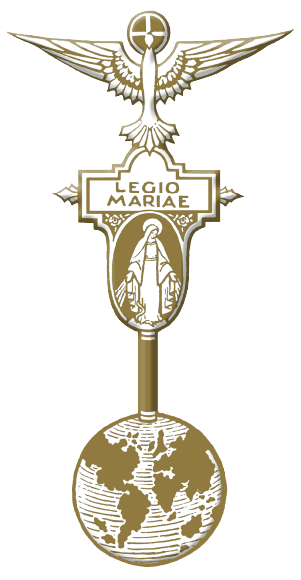April 2018 Allocutio
The Divine Office and the Legionary
Fr. Bede McGregor O.P.
The Handbook tells us: ‘Spiritual Directors and Presidents shall endeavour to increase their Praetorian membership, but shall as well, keep in touch with existing members so that they may not tire in their chivalrous undertaking.’ It is in this context that I would like to offer a reflection on the Divine Office.
First of all Frank Duff, our founder, never recommended anything in the Handbook that he himself had not lived and deeply considered and prayed over. So the Divine Office played a very significant part in his interior life. Fr. Michael Brown S.J. taught Frank how to say the Office and in 1917 at the age of 28 he started praying it. At first he found it very tiring and gave it up for a few days but then started again and continued praying it for the rest of his life. Towards the end of his life he was able to say: ‘Since I first started saying the Office in 1917 I have never missed a line of it.’ In those days the Office was in Latin and considerably longer that it is now! For Frank the Office was not simply an obligation but a great privilege. As he put it: ‘I have looked on the Divine Office as pure communication with God.’ He reported to Fr. Bradshaw that he began to appreciate that the essential element of prayer is, not the asserting of oneself, but the acknowledgement of one’s own nothingness and unworthiness and the praising of God’s infinite beauty and goodness.’
In his foreword to the Shorter Breviary published by the Legion of Mary he writes: ‘Why should people say an Office? The special value of the liturgy is that it is the official prayer of the Church, the voice of the Mystical Body, in which all our poor voices intermingle with the voice of Our Lord and take on the quality of His prayer. This places liturgical prayer on an eminence over our personal prayers.’ St. Augustine is the great theologian of liturgical prayer and he writes: ‘We pray to Him in the form of God; he prays in the form of the slave (i.e. ourselves). There he is the Creator; here he is in the creature. He changes not, but he takes the creature and changes it into himself, making us one man, head and body with himself. We pray therefore to him, and through him and in him; we pray with him and he prays with us; we recite this prayer of the psalms in him and he recites it in us.’ Abbot Eugene Boylan summarises the teaching of St. Augustine as follows: ‘This is the great importance of the Office: It is the prayer of Christ said by Christ to the Father of Christ, and when we recite the office, we enter into Christ, we put on Christ, we are one with Christ. In each of us the Father sees and hears Christ, his well beloved Son in whom he is well pleased… it is a question of replacing ourselves, and of getting rid of ourselves, and of substituting for ourselves the person and the prayer of Christ.’ In other words the praying of the Office is a way of abiding in the praying Christ and making his prayer our own.
One of the most important things for us to remember about praying the Divine Office is that it is essentially the worship of God. It is about Adoration of God. Saint Pope John Paul 11 put it very memorably when he said: ‘A moment of true adoration has greater value and spiritual fruit than the most intense activity, even apostolic activity itself.’ It should be helpful to remember that the praying of the Office is a sublime apostolate because it is a continuation in and through us of the prayer of Christ among us.
Of course, many of us know it can take time to get to know the hang of really praying the Divine Office in the early months and even years. Perhaps St. Thomas Aquinas on the role of attention in prayer may help us. Let us paraphrase his teaching: in praying the Office we pay attention to the way we say it i.e. to the singing or chanting or reciting of it; we may attend to the words we say i.e. the meaning or the message of the texts, and lastly the beautiful attention to the Person who is praying the Office with us, the Person who is really saying the Office. In other words we are never alone when praying the Office; we pray it always with Mary the Mother of the Mystical Body of Christ, with all the angels and saints and every member of the Mystical Body. And we must add however briefly that the Office is also a sublime prayer of intercession for the whole Church and the entire world. It would be a tragic situation if we did not continuously pray for the people we meet and serve in our Legion apostolates.
Let me conclude by quoting once more Abbot Eugene Boylan with a few interjections of my own: ‘First things must come first. God has a first claim on our direct service. All other services – even the service of souls – must have him not only for its final end, but also for its first principle. The Divine Office plays a great part in ensuring the preservation of this perspective, and we must convince and frequently remind ourselves of the importance of the Divine Office not only in the direct worship of God but also in the apostolic care of souls. We repeat that after the Mass a priest (and I might add legionary) can hardly find a more efficient way of serving God and saving souls than by the devout recitation of the Divine Office.’

